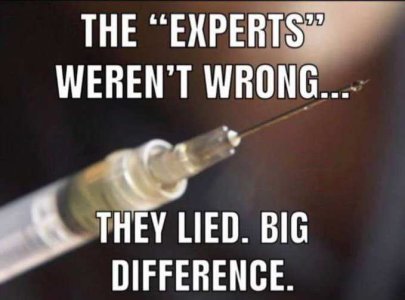So those Wuhan Virology Lab scientists must have been eating bats on their lunch hour. Go figure. Can't think of any other explanation.Dauph said:https://public.substack.com/p/first-people-sickened-by-covid-19
First People Sickened By COVID-19 Were Chinese Scientists At Wuhan Institute Of Virology, Say US Government Sources
https://nypost.com/2023/06/13/wuhan-scientists-were-the-first-to-contract-covid-19-report/amp/
Wuhan lab scientists researching coronavirus were the first to contract COVID-19: report
Navigation
Install the app
How to install the app on iOS
Follow along with the video below to see how to install our site as a web app on your home screen.
Note: This feature may not be available in some browsers.
More options
Style variation
You are using an out of date browser. It may not display this or other websites correctly.
You should upgrade or use an alternative browser.
You should upgrade or use an alternative browser.
ivermectin (Wuhan virus)
- Thread starter smithers599
- Start date
Tenring
Member
Dauph said:hd2/status/1672930243575783428?s=20
Yep - killing deplorable people for money
https://thenationalpulse.com/2023/06/28/wuhan-whistleblower-covid-was-a-ccp-bioweapon/
Wuhan Whistleblower: ‘COVID Was A CCP Bioweapon’.
The Chinese Communist Party (CCP) deliberately engineered COVID-19 as a “bioweapon,” and conducted tests of coronavirus strains with human contagion in mind, claims Chao Shao, a former researcher at the Wuhan Institute of Virology (WIV)
Wuhan Whistleblower: ‘COVID Was A CCP Bioweapon’.
The Chinese Communist Party (CCP) deliberately engineered COVID-19 as a “bioweapon,” and conducted tests of coronavirus strains with human contagion in mind, claims Chao Shao, a former researcher at the Wuhan Institute of Virology (WIV)
https://dailysceptic.org/2023/07/06/lancet-study-on-covid-vaccine-autopsies-finds-74-were-caused-by-vaccine-journal-removes-study-within-24-hours/
Lancet Study on Covid Vaccine Autopsies Finds 74% Were Caused by Vaccine – Study is Removed Within 24 Hours
Lancet Study on Covid Vaccine Autopsies Finds 74% Were Caused by Vaccine – Study is Removed Within 24 Hours
Suck My Glock
Member
https://twitter.com/bennyjohnson/status/1682755010566803457
Tenring
Member
:lol: :clap:
More and more
https://www.dailymail.co.uk/news/article-12336279/Elon-Musk-sparks-fury-conspiracy-theory-vaccine-caused-Bronny-James-cardiac-arrest-training-USC.html
Bronny James' cardiac arrest is linked to the COVID-19 vaccine, Elon Musk suggests
https://www.dailymail.co.uk/news/article-12336279/Elon-Musk-sparks-fury-conspiracy-theory-vaccine-caused-Bronny-James-cardiac-arrest-training-USC.html
Bronny James' cardiac arrest is linked to the COVID-19 vaccine, Elon Musk suggests
https://thenationalpulse.com/2023/07/27/1-in-35-who-got-boosted-developed-myocarditis-study-finds/
One in 35 people who received the COVID-19 mRNA booster vaccinations had vaccine-associated myocardial injury, according to a peer-reviewed, industry-independent study from the University of Basel
One in 35 people who received the COVID-19 mRNA booster vaccinations had vaccine-associated myocardial injury, according to a peer-reviewed, industry-independent study from the University of Basel
Dauph said:https://thenationalpulse.com/2023/07/27/1-in-35-who-got-boosted-developed-myocarditis-study-finds/
One in 35 people who received the COVID-19 mRNA booster vaccinations had vaccine-associated myocardial injury, according to a peer-reviewed, industry-independent study from the University of Basel
Interesting article Dauph ... an article citing a peer-reviewed paper - I'm in!!!
However I find that the "National Pulse" seems to have found some drama here that the study author definitely seems to not share - if you go to the University of Basel's website - the author discusses his findings with contrary interpretation or drama than the National Pulse:
https://www.unibas.ch/en/News-Events/News/Uni-Research/Temporary-mild-damage-to-heart-muscle-cells-after-Covid-19-booster-vaccination.html
Here is the author taking a pretty hard disclaimer from mRNA being the culprit:
It sounds like the mRNA is responsible?
Not necessarily. More mRNA means more viral protein and thus a stronger immune response. So we can’t yet say whether it’s the higher dose of mRNA or the more severe reaction by the immune system that’s responsible for the damage.
The researcher had to admit that they have no true baseline for the cardiac troponin levels that they are determining "damage" from. Review of the article itself clearly shows no baseline or control group either (for the unvaccinated):
In comparison, what percentage of those infected with Covid-19 suffer damage to cardiac muscle cells as a result of the virus?
We don’t know that exactly either. What we do know is that more severe cases of Covid-19 can also damage the heart muscle, but this has not yet been systematically investigated on the basis of the very sensitive cardiac troponin measurement. Ideally, this would also involve measuring cardiac troponin levels both before and during the disease.
The researcher had to admit that they are not using a clinically defensible (MRI) evaluation for cardiac damage - rather having to resort to the use of a seral marker:
You say “temporary” - how long does this damage last and how dangerous is it?
I have to emphasize that this is a mild effect. Symptoms include shortness of breath, fatigue and possibly pressure on the chest, but as I said, they are rather mild and non-specific. We performed further investigation in the study participants with elevated cardiac troponin levels. On the following day, Day 4 after vaccination, cardiac troponin values were back in the normal range in around half of the 22 affected individuals. This marker is extremely sensitive – with other methods such as MRI we wouldn’t have been able to detect any damage to the cardiac muscle, as it only becomes visible once the damage there is about three to five times greater.
I like how the author approaches those with vaccination hestancy:
Some people are still skeptical about mRNA vaccination because they say it hasn’t been tested enough. Are they right?
I wouldn't say that. mRNA vaccination technology is a fantastic development. This efficient protection provided by the Moderna and Pfizer/Biontech vaccines was a medical sensation – without this development, the damage caused by the pandemic would have been so much worse. The vaccines saved millions of lives.
I was wondering what kind of peer-reviewed journal would even bother publishing research without a control group - and - not surprisingly - these sorts of journals (respectable as they are & with good faith amongst professionals) are used by professional/peer groups as a presentation platform to gain peer consensus more than present concrete findings. When you view the article itself in that context, it's surprising that the "National Pulse" would bother reporting so bombastically at this point.
Here are some related articles from more appropriate journals on the topic:
1 – Castiello et al. (2022) COVID-19 and myocarditis: a systematic review and overview of current challenges. Heart failure review.
2 – Buckley et al. (2021) Prevalence and clinical outcomes of myocarditis and pericarditis in 718,365 COVID-19 patients. European Journal of Clinical Investigation.
3 – Heymans & Cooper (2021) Myocarditis after COVID-19 mRNA vaccination: clinical observations and potential mechanisms. Nature reviews cardiology.
4 – Boehmer et al. (2021) Association Between COVID-19 and Myocarditis Using Hospital-Based Administrative Data — United States, March 2020–January 2021. Morbidity and mortality weekly review.
5 – Wong et al. (2022) Risk of myocarditis and pericarditis after the COVID-19 mRNA vaccination in the USA: a cohort study in claims databases. The lancet.
6 – Voleti et al. (2022) Myocarditis in SARS-CoV-2 infection vs. COVID-19 vaccination: A systematic review and meta-analysis. Frontiers in cardiovascular research.
7 – Pantone et al. (2022) Risk of Myocarditis After Sequential Doses of COVID-19 Vaccine and SARS-CoV-2 Infection by Age and Sex. Circulation.
8 – Korff et al. (2006) Differential diagnosis of elevated troponins. Heart.
My interpretation of the more appropriate articles sourced from more appropriate journals for drawing overall causality, that one could only substantially see a significant increase in cardiac damage:
- In the unvaccinated who get COVID
- In Men under 40
https://amgreatness.com/2023/08/04/pfizer-and-moderna-reps-put-on-the-hot-seat-in-fiery-senate-hearing-in-australia/
Pfizer and Moderna Reps Put on the Hot Seat in Fiery Senate Hearing in Australia
https://twitter.com/OV_Matter/status/1687369849054642176?ref_src=twsrc%5Etfw%7Ctwcamp%5Etweetembed%7Ctwterm%5E1687369849054642176%7Ctwgr%5Ee76c47fc6efcaf1894ba0f51c5eb22dfdd6845bf%7Ctwcon%5Es1_&ref_url=https%3A%2F%2Famgreatness.com%2F2023%2F08%2F04%2Fpfizer-and-moderna-reps-put-on-the-hot-seat-in-fiery-senate-hearing-in-australia%2F
https://twitter.com/Resist_05/status/1687332318728671233?ref_src=twsrc%5Etfw%7Ctwcamp%5Etweetembed%7Ctwterm%5E1687332318728671233%7Ctwgr%5Ee76c47fc6efcaf1894ba0f51c5eb22dfdd6845bf%7Ctwcon%5Es1_&ref_url=https%3A%2F%2Famgreatness.com%2F2023%2F08%2F04%2Fpfizer-and-moderna-reps-put-on-the-hot-seat-in-fiery-senate-hearing-in-australia%2F
Pfizer and Moderna Reps Put on the Hot Seat in Fiery Senate Hearing in Australia
https://twitter.com/OV_Matter/status/1687369849054642176?ref_src=twsrc%5Etfw%7Ctwcamp%5Etweetembed%7Ctwterm%5E1687369849054642176%7Ctwgr%5Ee76c47fc6efcaf1894ba0f51c5eb22dfdd6845bf%7Ctwcon%5Es1_&ref_url=https%3A%2F%2Famgreatness.com%2F2023%2F08%2F04%2Fpfizer-and-moderna-reps-put-on-the-hot-seat-in-fiery-senate-hearing-in-australia%2F
https://twitter.com/Resist_05/status/1687332318728671233?ref_src=twsrc%5Etfw%7Ctwcamp%5Etweetembed%7Ctwterm%5E1687332318728671233%7Ctwgr%5Ee76c47fc6efcaf1894ba0f51c5eb22dfdd6845bf%7Ctwcon%5Es1_&ref_url=https%3A%2F%2Famgreatness.com%2F2023%2F08%2F04%2Fpfizer-and-moderna-reps-put-on-the-hot-seat-in-fiery-senate-hearing-in-australia%2F
https://www.realclearpolitics.com/video/2023/08/11/sen_ron_johnson_covid_was_preplanned_by_an_elite_group_of_people_planned_for_our_loss_of_freedom.html
Sen. Ron Johnson: Covid-19 Was "Preplanned By An Elite Group Of People," "Planned For Our Loss Of Freedom"
Sen. Ron Johnson: Covid-19 Was "Preplanned By An Elite Group Of People," "Planned For Our Loss Of Freedom"
Suck My Glock
Member
https://www.courthousenews.com/ivermectin-proponents-ask-fifth-circuit-to-revive-lawsuit-against-fda/
Ivermectin proponents ask Fifth Circuit to revive lawsuit against FDA
A government attorney likened the FDA’s warnings against treating Covid with ivermectin — a livestock dewormer approved in lower doses for human ailments — to its advice not to eat chicken cooked in NyQuil.
https://www.theepochtimes.com/health/doctors-can-prescribe-ivermectin-for-covid-19-fda-5456584?utm_medium=social&utm_source=twitter&utm_campaign=digitalsub?utm_source=epochHG&utm_campaign=CFP&src_src=epochHG&src_cmp=CFP
Doctors Can Prescribe Ivermectin for COVID-19: FDA Lawyer
Ivermectin proponents ask Fifth Circuit to revive lawsuit against FDA
A government attorney likened the FDA’s warnings against treating Covid with ivermectin — a livestock dewormer approved in lower doses for human ailments — to its advice not to eat chicken cooked in NyQuil.
https://www.theepochtimes.com/health/doctors-can-prescribe-ivermectin-for-covid-19-fda-5456584?utm_medium=social&utm_source=twitter&utm_campaign=digitalsub?utm_source=epochHG&utm_campaign=CFP&src_src=epochHG&src_cmp=CFP
Doctors Can Prescribe Ivermectin for COVID-19: FDA Lawyer
Similar threads
- Replies
- 6
- Views
- 2K
- Replies
- 11
- Views
- 24K
- Replies
- 3
- Views
- 2K

